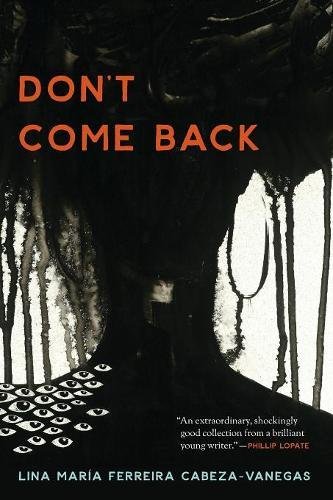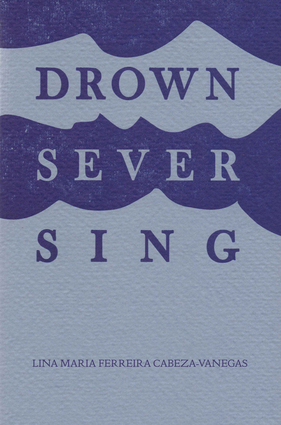About
Lina was born and raised (mostly) in Bogota, Colombia and has since then been tumbleweeding aimlessly through the world. She is the author of Drown Sever Sing, and her ode to cannibalism can be found in the collection titled, After Montaigne: Contemporary Essayists Cover the Essays. She is a graduate of The University of Iowa's Creative Nonfiction and Literary Translation programs, and her work has been featured in Arts and Letters, The Chicago Review, and Fourth Genre, among others. Her new book, Don't Come Back, is published by Mad River Books, an imprint of The Ohio State University Press (January 2017). Ferreira is a recipient of the 2016 Rona Jaffe Foundation Writer's Award.
Books


Works in progress
In Periodicals, Anthologies & Podcasts
"One Night Less in Baghdad."
Translation. "Una Noche Menos en Baghdad" by Pedro M. Villalora, for podcast Play for Voices. 2018."Coming Back."
Feature. Poets & Writers. Forthcoming 2017."The Man Walks In and Removes His Hat."
Essay. The LA Review of Books. Forthcoming 2017."Aurelia."
Essay. Eleven Eleven. January 2017."Allá En La Fuente."
Essay in the anthology This is the Place. Seal Press, Perseus Books, LLC, a subsidiary of Hachette Book Group, Inc. September 2017."María, María, María, María."
(Excerpt from Translations in Diagram in Translation). Translation. Stonecutter Journal. Spring 2016."Tinfoil Astronaut."
Essay. The Sunday Rumpus. Forthcoming November 2016."Drowning Lessons."
Essay. Hotel Amerika. September 2016."Rio Que Sale" & "Del Dicho Al Hecho"
(Excerpt from Translations in Diagram in Translation). Translation. Stonecutter Journal. Spring 2016."Of Cannibal."
Essay in the anthology After Montaigne. University of Georgia Press. March 2015."Pain Pays the Income of Each Precious Thing."
Essay. Brevity. September 2015."The Peach Orchard."
Essay. Fourth Genre. Fall 2015"Cain."
Short story. The Baltimore Review. July 2015."The Wee She-Dog."
Translation/poem. M-Dash. June 2015."BOG – MIA – CID."
Essay. Arts & Letters. Spring 2015."Muybridge."
Poem. Rattle. June 2015."Empire of Toes."
Essay. The Chicago Review. October 2014."Practice."
Essay. Guernica/PEN America. June 2014"El Hombre Caimán."
Short story. The Rio Grande Review. 2014."Catching Moths."
Essay. Drunken Boat. 2014."Rare Misprinted Scott Russell Sanders Postcard: Next best thing to 'Inverted Jenny'; essayist must have."
Collaboration, Franklin, Joey, Madden, Patrick, et al.) The Normal School. Fall 2013."Amor con Amor."
Essay. Anomalous Press. 2013."Del Agua Mansa Me Libre Dios."
Translation/Fiction. Anomalous Press. 2013."Lo Que Quiere."
Essay. Chapbook collaboration with Kendra Greene. Greene Ink Press. 2011."Deal Amor Al Odio."
Essay. Anomalous Press. 2011."Sonambula."
Essay. H.O.W. Journal. 2011."Catalogue of Dead Birds."
Essay. Bellingham Review. 2010."In Absentia: On Things Remembered and Forgotten."
Essay. The Iron Horse Review. 2009."After The Colonel."
Essay. Wag's Revue, Fall 2009.“The cats were poisoned seven days before my grandfather fell from the sky strapped to a faulty parachute. One, Niky, made it to my grandmother's feet, washing them with blood before collapsing. Yuri never came back.
Before the cats, though, it was the chickens. About a month earlier, a plague fell on them like a man out of a clear blue sky. One died, then another, and another, and another still, and in between feathers and pestilence my grandmother asked what it was that was killing them but no one knew, so more chickens died and then the colonel fell from his plane.”
"What I Know About Love."
Essay. Inscape. Fall 2007.“Her husband is long like a lecture and thin like Bible pages. He tried to tell me—but his toothless accent was too thick so I had to hear it from someone else–that he was an Argentinean soccer player once. He stood around as I dove headfirst into knees and shins belonging to boys with worn-out tennis shoes trying to score against my team. My arms wrapped around the ball like desperate lovers, and worn-out tennis shoes raced back into midfield.”
"Margarita Didn't Mind."
Essay. Inscape. Fall 2006.“She wore a white lace dress; a normal dress, I guess, for the occasion. I wonder who picked it. As I stood over the wooden box, it seemed to me that the dress had grown an unnatural extension, and it ate up her neck in sloppy stitches. The stale white dress was more alive than she was–hands stiffly bent over stomach and eyelids pulled over like the final bed sheets of the corpse. She doesn't look peaceful at all, sleeping there, I thought while I watched her encased in white silk, just very still and quiet, like the silence in hospitals or of angry parents.”